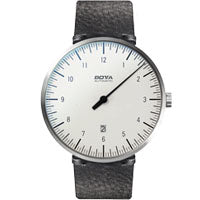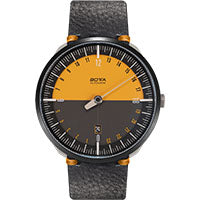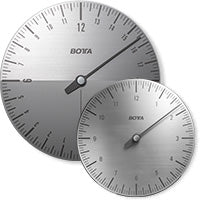The term "New Work" makes many people think of the digitalization of work, home office, reduced working hours, "remote work" - i.e. working regardless of location - and even "workation". For younger employees in particular Generation Y and Gen Z, the harmonious coexistence of work and private life plays an important role. Last but not least, environmental protection and resource conservation also play a significant role in the "New Work" phenomenon.
In this article, I try to address some additional aspects from my experience as an entrepreneur, employer and reflective citizen, which from my point of view have not yet been taken into account.
You, as valued readers, will not find any references or analogies to our wristwatches this time, because I believe that such an important topic deserves to be addressed regardless of one's own goals and interests.

In my view, "New Work" in the sense of adapting or redesigning our working world is not a fashion or an option, but a necessity in order to take account of the upcoming changes in our globalized world. However, the differentiated consideration of all current conditions and motives for the transformation of the working world is crucial for the success of such changes.
If convenience and self-interest are the determining forces for change, our economy, and with it all of us, will suffer irreversible damage. However, if the focus is on the changes in global circumstances (rapidly growing importance of emerging countries) and local opportunities (new values, new educational structure, new means of work), New Work can help to maintain - at least partially - the hard-earned prosperity of our society. "New Work," however, must always be considered in a local and global context.
The prosperity of Europe and Germany in particular is primarily based on extraordinary intellectual achievements, combined with a great deal of hard work and personal commitment. Without these three components, there will no longer be a comparable standard of living in this country in the future, because the world around us has changed and continues to change rapidly. This is especially true for emerging Asian countries such as China and India.
Our supremacies and knowledge monopolies are visibly diminishing, and at the same rate as these states are advancing in terms of innovation and production.
This is a race that we can never win in terms of quantity - only in terms of quality. However, even with the best ideas and concepts, we will not be able to compete with the inexhaustible workload and the general conditions in Asia with ever fewer working hours. In addition to intelligence and innovative strength, hard work and idealistic commitment will continue to be required in the future. However, we also need the desire to change. Above all, we should recognize and further develop our core competencies and, on the other hand, drastically reduce our paralyzing bureaucracy.
"Who stops getting better, has stopped being good". This quote from Philip Rosenthal sums it up perfectly.

I don't like the term "human resources" very much. First, it degrades people to resources, like oil, ore, or energy. People are individuals and personalities with specific abilities and weaknesses.
The more highly qualified an activity is, the less a person working there can be replaced by any other. This fundamentally distinguishes people from "non-human resources.
The key to the success of our Western society, however, lies precisely in the specified and individualized use of people.
In other words: Only when people work in areas for which they are particularly well suited, they can fully realize their potential and make a highly productive contribution to society. If this succeeds, such a society is enormously efficient, economically significant and therefore geopolitically relevant.
Accordingly, "New Work" must start with "New Education", if the resulting "New Work" is to be efficient and successful.

In my opinion, the choice of career direction is the second most important or perhaps even the most important decision in a person's life. On the one hand, an individual usually spends a considerable part of life in professional activities, and on the other hand, there is hardly any activity that shapes a person as much as a profession. Therefore, the choice of profession deserves special attention and care.
Consequently, it will be an essential prerequisite for the performance and future viability of our society that people are employed according to their abilities and their characters.
Not all people are the same. In addition to different talents, there are also different levels of motivation. While one person needs as much freedom and self-determination as possible, another needs and appreciates clear guidelines and limits in order to be able to move safely and in a goal-oriented manner in his or her working environment. The recognition of strengths and weaknesses, as well as the classification according to type and appropriate education should be an immanent part and constant companion of school and vocational training. If it is to succeed, New Work must begin not only at work, but already in the preschool and school education models. "New Work" must be conceived deductively and implemented inductively.
I claim that people who work in their ideal competence and performance area are automatically much more efficient and satisfied (= intrinsic motivation) - even without incentivization (= extrinsic motivation). This is an ideal prerequisite for a very high-performing and satisfied society. And thus, a real goal for New Work.
As a society, we live in a prosperity that is essentially based not on the achievements of our own generation, but on those of our ancestors. The achievements of our generation will in turn be decisive for the prosperity of our descendants. So there always exists a considerable shift from a (current) activity/achievement and its impact on the (future) prosperity of a society. I call this shift "impact dilation" (derived from "time dilation" - a term from relativity theory). Therefore, anyone who strives for a future-oriented "New Work" must also be aware of its effect on the near and far future. Egoistic thinking in the sense of "as little work as possible" is not sensible here and certainly not social in the long term.

New Work should always be thought in terms of the economy and the future. New Work is more than just the question "What services and benefits must employers offer in order to continue to find and retain qualified workers in the future?" Rather, we should be asking "How do we need to change the entire world of education and work to remain competitive with our national economy in the future?" To do this, we need to fundamentally change many traditional ways of thinking and methods. Through a "New Thinking". Otherwise, our economy, which is currently still functioning to some extent, is in danger of being crushed between semi-professional work models and rapidly developing, powerful competition abroad.

For me, the currently fashionable term "work-life balance" is "thinking in the wrong direction". In my understanding, "work" is rather an essential part of "life" and not the antagonist. Of course, life cannot consist only of work. However, work should not be viewed as a burden that needs to get done as quickly as possible so that the real life can begin. This way of thinking, which is essentially based on the circumstances in the early days of industrialization, is "old work" in the best sense of the word and should be replaced by work that is as self-determined and self-responsible as possible. Ideally, work should be an essential and fulfilling part of life. This can certainly not be realized in all professions and 100%, but should be strived for as far as possible for the benefit of higher performance and satisfaction of all involved. In terms of its goal, this way of thinking coincides with the proclaimed values of "New Work". The claim lies in a socially responsible implementation.
I ask the question whether it would not make more sense to think about what I consider a more sensible "static-dynamic balance" instead of the often invoked "work-life balance". In my experience and observations, people lack not so much leisure time as meaningful exercise. And this is true both in leisure time and at work.
Our daily work routine usually takes place sitting down and in front of a computer screen. In many cases this is unavoidable, but not in all. With a little flexibility and new thinking, certain types of work, such as small group meetings or brainstorming sessions, can be done just as well or often even better during a walk. We at BOTTA design have been practicing this for many years with success and good feedback from all involved. Breaks can also be used for active movement. With the right willpower, you can do more than you might think at first.
The more static professional life is, the more dynamic and movement-oriented leisure time should logically be. Here, "the screen" can often be much more easily exchanged for exercise and/or meetings with friends. Social encounters instead of social media. Here, the balance is already in the hands of each individual. Here, moreover, a new awareness of movement is also appropriate for society as a whole. We can learn a lot from traditional Asian cultures that integrated movement naturally and harmoniously into everyday life.

Satisfied employees do not result from maximum incentivization, but from meaningful activity. In this sense, the work of the future should be democratized. Here, some existing work models are certainly no longer up to date. (Performance-independent payment, remuneration according to a fixed time scheme, etc.) Here, too, a fundamental reform geared to current and future realities would make sense.
Current work models are still oriented toward the (early) industrial society and not toward the long-established information society. Of course, depending on the type of work, hybrid forms and derivatives are also possible and sensible here (see above). A real task for a meaningful and future-proof "new form of work".
I hope that I have been able to provide some food for thought with my very personal experiences and thoughts in order to orient our future working world towards a stable and livable future.
Your Klaus Botta











7 comments